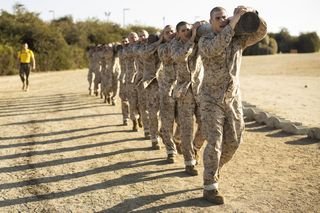Stress
Military Lessons for Stress Related to COVID-19
You may be experiencing a normal, expected, and transient stress reaction.
Posted April 2, 2020 Reviewed by Ekua Hagan

The military is probably the leading expert on stress, not because it tries to be, but because that is the nature of military life. Service members are intentionally and routinely stressed, so during crises, war, and other incidents, they are able to function, excel, and complete the mission.
Think about the current national situation related to COVID-19 and compare it to life in the military. From day one, service members experience an abrupt loss of control over their environment (similarity #1), separation from loved ones (similarity #2), loss of the ability to manage stress in their typical ways (similarity #3), and loss of freedom of movement (similarity #4).
Even society’s recent changes to how we can get food and what we eat is a fact of life for the military (similarity #5). Any veteran who has survived on field rations and created recipes and traded food from the “ingredients” available in a Meal Ready to Eat (better known as MRE) has advanced skills in making do. (And if you are a commissary shopper, you already know toilet paper wasn’t the first thing to disappear from the shelves; it was MREs, a full three weeks before the hand sanitizer and toilet paper disappeared.)
Stress and anxiety in response to the current situation, in military parlance, would be considered an operational stress reaction, one which is understandably affecting a large portion of the nation. For those unfamiliar with the concepts of military stress reactions, the most important takeaways are that they are expected, normal, and transient.
Stress reactions can encompass just about any symptoms, including anxiety, fear, sleep disturbance, worry, depressed mood, concentration problems, irritability, and even physical symptoms, such as headaches and diarrhea. A military operational stress reaction typically arises due to a specific threat or a prolonged situation, neither of which includes combat, but that is sufficiently dire to threaten safety (similarity #6).
What does the military say about avoiding and/or managing these reactions?
Keep connected to others. Social support and unit cohesion are known preventative measures for a myriad of problems. You may not be able to travel and spend time with your primary support network or ill family members, but there are ways to keep in touch and informed. Service members use social media, videoconferencing platforms, the phone, and good, old-fashioned snail mail to maintain vigilant contact with others. These techniques are never optimal or completely satisfying, but they are effective.
Get good sleep. In the military environment, sleep deprivation increases the risk of operational stress reaction and results in irritability, poor coping strategies, poor decisions, and service members become less cooperative and less team-focused (Killgore, 2013). Poor sleep is known to exacerbate other problems, so a primary focus on your own physical and emotional health should be the quality of your sleep.
Stay in shape. For the military, physical fitness is obviously an issue of life and death. The physical demands of military service are significant, and those who are in good physical shape are also the best performers. However, the military knows those in good shape physically are in better shape cognitively and emotionally as well. New research is bearing this out with exercise being identified as not only a prevention strategy for the development of psychological health problems but also as an effective treatment.
Maintain an expectancy you will get through this and return to duty (i.e., normal life). Service member expectations of what is most likely to occur play a large role in the actual outcome. When service members believe they can cope effectively with a situation, it is more likely they will do so (Kennedy, in press). Making good decisions, maintaining contact with like-minded people, and taking initiative and control where you can, all help with developing and maintaining this expectancy.
Keep alcohol use to a minimum. The problems associated with excessive alcohol use are well known in both military and non-military populations. The bottom line is binge, unhealthy, and excessive drinking (or other substance misuses) are contrary to good coping strategies, physical health, decision making, mood, and so on.
Stay informed. Service members going into a stressful situation perform better when they have leadership that communicates, when they know what to expect and what stressors may occur. Our current problem isn’t a lack of information; it’s that too much information is out there. Keep your focus on reputable sources, like the Centers for Disease Control and Prevention and TRICARE for military families, and filter out the rest. Too much information, especially contradictory information, is not good for psychological health, and compulsively viewing news stories about the crisis can impair your psychological well-being and take your attention away from the more important things in your life.
Remember, the nation’s stress right now is considered a normal, expected, and transient reaction to the world crisis. There are ways to mitigate this. We can learn a lot by looking at what our service members and veterans do on a regular basis, as these strategies are effective and ingrained in the military culture. I am not kidding when I say that if you are struggling, a veteran may be absolutely the best person to reach out to.
The views presented in this blog post are those of the author and do not reflect the official policy or position of the U.S. Navy, the Defense Health Agency, the Department of Defense, the U.S. Government, or any other institution with which the author is affiliated.
References
Kennedy, C. H. (2020). Military Stress Reactions: Rethinking Trauma and PTSD. New York, NY: Guilford Press.
Killgore, W. D. S. (2013). Sleep loss and performance. In B. A. Moore & J. E. Barnett (Eds.), Military psychologists’ desk reference (pp. 241–246). New York: Oxford University Press.




